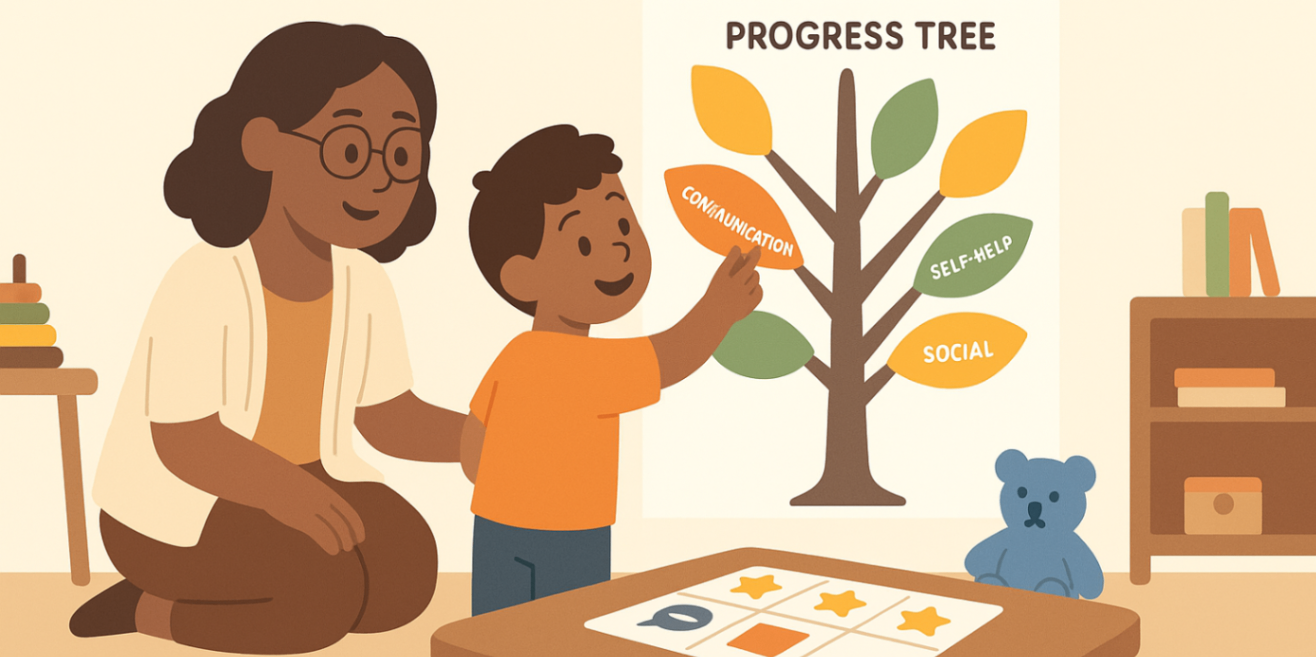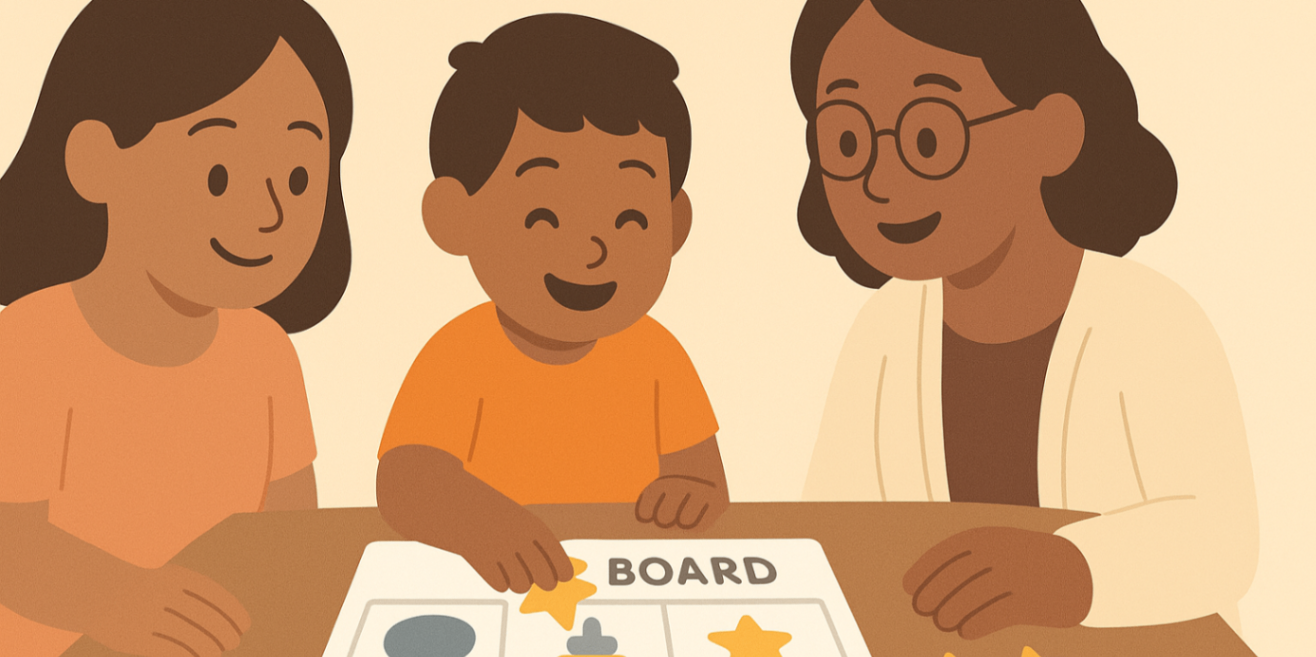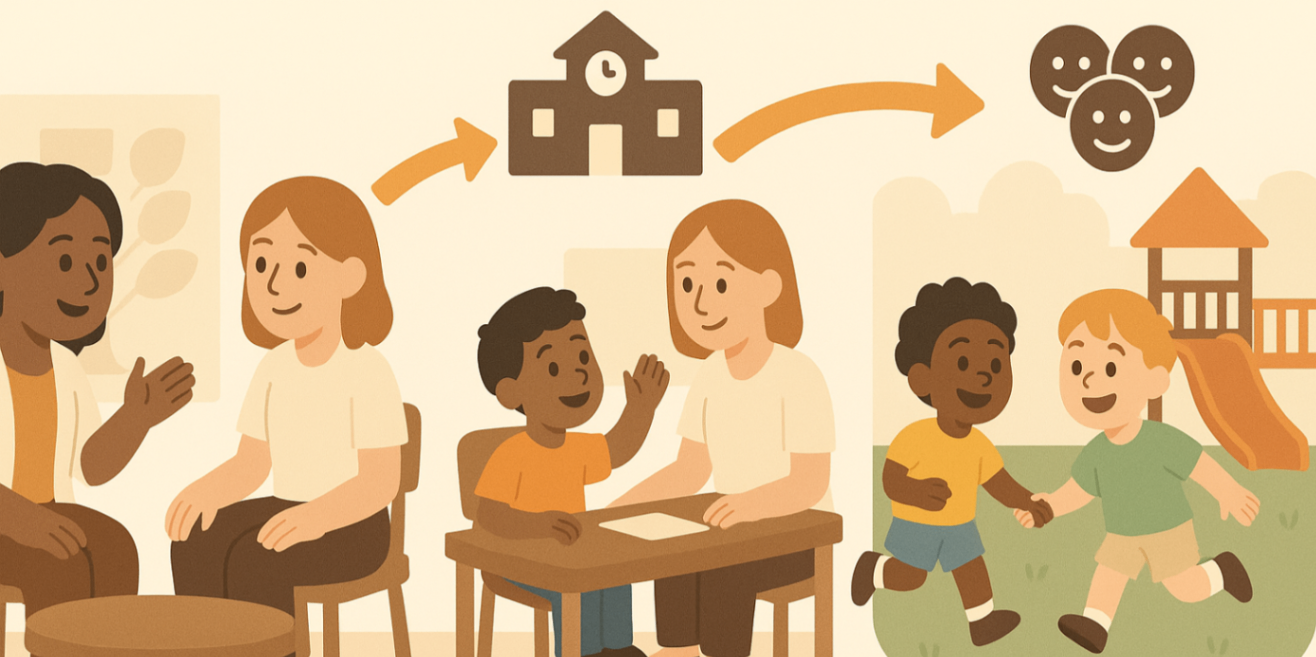
how behaviour therapy for kids with autism supports growth
15 August, 2025
Last Updated November 19, 2025
Introduction
Behaviour therapy offers children with autism the tools they need to build communication, independence and confidence. At daar Liverpool, our team of NDIS-approved behaviour support practitioners works with families to deliver tailored strategies that support children’s real-world growth. If you’re new to this topic, explore our parent’s guide behaviour support plans under NDIS.
Key Highlights
-
Behavioral therapy is a key way to support children who have autism spectrum disorder. It helps with daily life, communication, and social skills.
-
Interventions like applied behavior analysis and cognitive behavioral therapy use positive reinforcement. These help a child develop behaviors you want to see and lessen unwanted ones.
-
Therapy plans are made for each child based on their needs, age, and symptoms of autism.
-
Evidence-based practice such as social skills training and play therapy help children be more independent. They also help improve emotional well-being.
-
Parents and caregivers have an important role. They use lessons from therapy in regular life with their children in natural settings. This makes the strategies work even better.
Understanding Behaviour Therapy for Children with Autism

For a child with autism, everyday tasks and social interactions can present significant challenges. Behaviour therapy focuses on understanding what drives a child’s behaviour, then teaching new skills and coping methods that help them engage with the world more confidently. At daar, we believe therapy isn’t just about reducing problematic behaviours — it is about nurturing the strengths and potential of each child.
Learn how Positive Behaviour Support (PBS) is used in tailored programs for children with autism.
Behaviour Therapy for Children with Autism — A 2025 Perspective
Behaviour therapy — including approaches such as Applied Behavior Analysis (ABA) — remains the most evidence-based support for children on the autism spectrum. Recent research emphasises how structured, consistent interventions foster not just behaviour change but also growth in communication, independence, and social participation.
For NDIS-funded plans in Australia, this means therapy must align with your child’s goals, their autism level (Level 1–3), and the functional impact of their support needs.
How the NDIS Supports Behaviour Therapy for Autism
Under the National Disability Insurance Agency (NDIA) framework, children with autism may access behaviour therapy under these plan categories:
-
Improved Daily Living: for supports that increase daily skills and behaviour regulation
-
Improved Relationships: for social interaction and communication
-
ECEI (Early Childhood Early Intervention): for younger children under 9
Key Points for Plan Funding:
-
Your child’s autism level (1, 2 or 3) helps determine the intensity of funded supports.
-
You should request therapy hours, behavioural assessments, monitoring and parent-training supports.
-
Ensure the provider is NDIS-registered and that the behaviour therapy goal links to functional outcomes (e.g., reduced meltdowns, improved self-regulation, increased communication).
-
Data tracking and progress reporting are increasingly expected in 2025 plan-reviews.
Autism Levels & What Behaviour Therapy Often Includes
H3: Level 1 – Requiring Support
Children may need moderate behaviour supports, focusing on building routines, social skills and communication. Therapy might include: parent training, social groups, school transition supports.
H3: Level 2 – Requiring Substantial Support
Supports are more intensive. Behaviour therapy often covers: frequent sessions, school-based consultation, AAC or communication supports, daily living skill building, sensory regulation.
H3: Level 3 – Requiring Very Substantial Support
Children may need high-intensity supports across settings: home, school, community. Behaviour therapy may include crisis planning, specialist behaviour practitioners, very structured interventions and large schedule of service hours.
Types of Behavioural Therapies for Kids on the Autism Spectrum
Children on the autism spectrum may get help from several types of behavioral therapy. These are made to fit their own needs and strengths. The most well-known methods are ABA therapy, cognitive behavioral therapy, and play-based interventions. These therapies focus on shaping behaviors. They help with communication, and build social skills.
ABA is known for the way it brings order to how people change their actions. At the same time, CBT helps people handle what they feel and think. Play therapy and social skills training are also used a lot, mainly with younger children. These tools are good for kids who need help making friends or getting along with others.
Let’s look at these main types more closely to see how they help children on the autism spectrum.
Applied Behavior Analysis (ABA) and Its Effectiveness
Applied behavior analysis (ABA) is a strong way to help children who are on the autism spectrum. This method uses real science to find what works best for each child. A big part of ABA is using positive reinforcement to help the child learn the behaviors you want to see. One thing that makes behavior analysis stand out is that you can use it in natural settings. This helps the child grow social skills and be better at talking with others.
Studies say that starting behavior analysis early and giving it often can help children learn daily living skills. These skills be things they use every day at home and with others. This can make the quality of life better, not just for the child but also for their families. With ABA, you get a plan that fits your child’s needs. This helps them feel good about who they are as they grow.
Cognitive Behavioral Therapy (CBT)
Cognitive Behavioral Therapy (CBT) is a helpful form of behavioral therapy for children with autism. It works to change thought patterns that can lead to anxiety and trouble in social interactions. This type of therapy gives children ways to cope, so they can deal with their emotions and build good communication skills. CBT helps kids learn more about themselves and practice problem-solving. This helps them use positive behaviors each day, which is very important in social interactions. When family members take part, it helps support the child’s mental health and helps them grow.
Other Evidence-Based Approaches: Social Skills Training and Play Therapy
Social skills training and play therapy can help children on the autism spectrum along with ABA and CBT. Social skills training is often done in small groups. The goal is to teach kids fundamental social skills. In these practice groups, children learn through clear teaching, watching others, and joining in practice time. They are shown how to read nonverbal cues. The practice also helps them start conversations and build friendships.
Play therapy helps kids talk, work together, and solve problems by using special play activities. It works well for young children or those who learn better by doing things with their hands. Play therapy can help them get better at making friends and doing activities of daily living.
Key features include:
-
Direct teaching and practice help kids learn social skills.
-
Play-based ways are used to help kids with joint attention and language.
-
There is a focus on relationship development intervention to help build strong bonds.
-
Support for daily living skills is given through fun and hands-on tasks.
Embedding Growth Mindset & Functional Gains Through Behaviour Therapy

Modern behaviour therapy doesn’t just aim to reduce challenging behaviour — it fosters a growth mindset and functional independence. Children learn that skills can improve with effort, and behaviour supports become stepping-stones to bigger goals.
Key strategies include:
-
Reinforcing efforts, not just outcomes
-
Embedding goals into daily routines (home, school, community)
-
Collaborative plans involving parents, therapists and educators
-
Regular review of progress via data, so supports evolve with the child
What Parents Can Expect from Behaviour Therapy Sessions
When a child starts behavioral therapy, parents can see that the plan is made to fit the child's needs. In the first sessions, the therapist will take time to get to know the child. They do a full check to understand what the child finds hard and what they do well. After that, they work on goals that match the child's strengths and what they need help with. They keep track of how things are going in every session. This helps make sure that the therapy keeps working and meets the child's needs.
Parent involvement plays a big role in how well behavioral therapy works. Therapists keep families updated and share tips they can use at home. This way, the child’s progress happens not only with the therapist but also in other places and through day-to-day routines. Working together helps the child do well in many areas.
If you’re researching local options, read Best Behavioural Therapy for Kids Near You for a clear guide on what to look for.
Why Families in Liverpool Choose daar for Behaviour Support
Families across Liverpool, Casula, Moorebank and surrounding suburbs trust daar because we provide:
-
NDIS-approved behaviour support tailored for children with autism
-
Multidisciplinary connections between speech, occupational and behaviour therapy
-
Therapy delivered in-clinic, at home or via telehealth to suit your family’s needs
-
Clear, measurable goals and regular progress updates
Are you ready to help your child build skills, confidence and independence? Book a consultation with daar Liverpool today and let us support your journey with NDIS-approved behaviour therapy designed for real progress.
Frequently Asked Questions
Does the NDIS fund behaviour therapy for kids with autism?
Yes — behaviour therapy for children with autism is funded when the child’s functional needs align with autism level, supported by a behaviour assessment and linked to NDIS goals.
How many hours of therapy will my child need?
It depends on your child’s autism level, functional needs, goals, setting (home/school/community) and provider recommendation. Your NDIS plan review will likely reference data and progress documentation.
Does behaviour therapy only happen in clinic?
No — therapy can happen in the home, school, community or a combination. Mobile therapy, school-based consults and parent coaching are fully valid under NDIS.
What is the difference between speech therapy and behaviour therapy for autism?
Speech therapy focuses on communication and language. Behaviour therapy focuses on behaviour, self-regulation, routines, functional participation and may integrate communication supports. Many programs work collaboratively.
.svg)

















